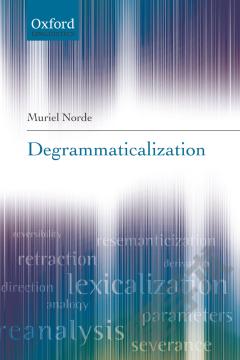Degrammaticalization
Abstract Degrammaticalization has been characterized as a composite change involving gains in morphosyntactic autonomy or phonetic and/or semantic substance. Such a definition is suggestive of a change (or set of changes) which may profitably be explored from a construction grammar perspective. In this article, we consider two cases of degrammaticalization, using âmorpheme-basedâ and âconstruction-basedâ parameters. We relate this to wider issues in grammaticalization research, for instance, the differences between accounts of grammaticalization which focus on reduction, and those which focus on expansion.
{{comment.content}}








 京公网安备 11010802027623号
京公网安备 11010802027623号